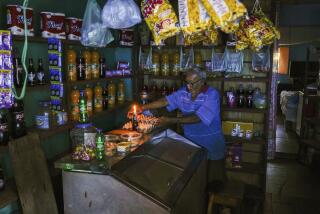Chavez seizes control of oil
- Share via
JOSE, VENEZUELA — Venezuela stripped the world’s biggest oil companies of operational control over massive Orinoco Belt crude projects Tuesday, sending in workers backed by troops to occupy the multibillion-dollar installations.
Rallying thousands of workers dressed in the signature red of his self-styled revolution, President Hugo Chavez hailed what he called the end of U.S.-prescribed policies that had opened up the largest oil reserves in the hemisphere to foreign investment.
“Today, we are ending this perverse era,” Chavez shouted, looking out from a platform over a sea of red hats, helmets and flags after the major step in his nationalization drive. “We have buried this policy of the opening up of our oil ... an opening that was nothing more than an attempt to take away from Venezuelans their most powerful and biggest natural resource.”
Behind him was a huge banner reading “Full oil sovereignty” and “Road to socialism,” Russian-build fighters roared overhead and in front of him women pushed toward the stage screaming for him to blow kisses. He obliged.
U.S. companies Exxon Mobil Corp., ConocoPhillips and Chevron Corp., Britain’s BP, Norway’s Statoil and France’s Total obeyed a February decree to transfer operational control of their projects developing the OPEC nation’s Orinoco crude reserve, one of the largest oil deposits outside the Middle East.
The May Day takeover came exactly a year after Bolivian President Evo Morales, a leftist ally of the anti-U.S. Chavez, startled investors by ordering troops to seize gas fields in his country, accelerating Latin America’s bid to reclaim resources.
The four Venezuelan projects are valued at more than $30 billion and can turn about 600,000 barrels per day of heavy, tarry crude into valuable synthetic oil.
Industry analysts fear Venezuela’s state oil company could ultimately run into production and safety problems when it loses the management and technology of the experienced majors. The foreign companies are discussing continued shareholding and compensation in sometimes contentious negotiations before a deadline next month.
Buoyed by an oil price bonanza in a major crude exporter to the U.S., Chavez is popular among Venezuela’s poor majority for spending freely on schools, clinics and food handouts.
The man who calls Cuban leader Fidel Castro his mentor vowed to take at least 60% of the projects, radicalizing his policies as he rules by decree and politicizes the army, state oil company and judiciary.
Although Venezuela claims output of more than 3 million barrels a day, analysts estimate it strains to pump 2.6 million daily barrels.
More to Read
Sign up for Essential California
The most important California stories and recommendations in your inbox every morning.
You may occasionally receive promotional content from the Los Angeles Times.










